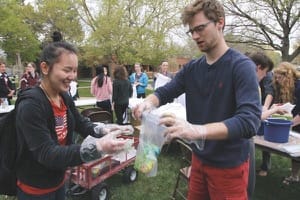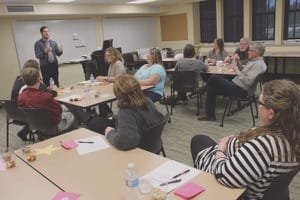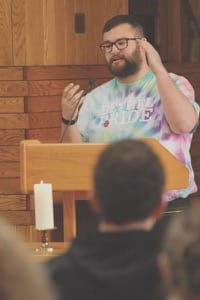Students open spaces for more perspectives on what it means to be “a diverse campus.”
 Matt Rodenberg helps Xi Cheng create her tie-dyed “Bethel Pride” T-shirt as part of the activities during the spring Pride and Inclusion Week on campus.
Matt Rodenberg helps Xi Cheng create her tie-dyed “Bethel Pride” T-shirt as part of the activities during the spring Pride and Inclusion Week on campus.Diversity on the Bethel campus came to center stage in the spring semester, sometimes in unexpected ways but with a common core of optimism for future growth and change.
Gabriel Fonseca, coordinator of Student Activities and Engagement, in only two years on campus has overseen significant new initiatives within the Student Life office, including an overhaul of the Student Government Association (SGA), debuted in spring 2015.
At the beginning of the 2015-16 school year, SGA held a public forum. Student leaders invited the student body to give their perspectives on what it means to be “a diverse campus” and how SGA could best support that diversity. Out of that forum grew the Diversity Council.
“We passed a bill to create it,” says Aida Martinez, graduating senior who was SGA secretary of diversity affairs and became the first chair of the Diversity Council. “It was made up of representatives from Culture Shock [international students’ club], Multicultural Student Union, Pueblos Unidos [Hispanic/Latino students], FemCore and Gay-Straight Alliance (GSA), and from the Student Activities Committee.”
The Diversity Council got off to a slow start. In the first few months, the only groups that responded were FemCore and GSA, Aida says.
In October, seniors Mareike Bergen and Zach Preheim, who both serve in student government, went with Gabriel to Tulsa, to the annual meeting of the National Association of Campus Activities (NACA). “The focus was on diversity on campus and creating activities that celebrate and support it,” Zach says.
“Both of us are part of GSA,” Mareike adds, “and we wanted to see the clubs on campus, the ones represented on the Diversity Council, be active.”
 Gabriel Fonseca, standing at left, leads a Safe Zone training for a group of Bethel faculty and staff.
Gabriel Fonseca, standing at left, leads a Safe Zone training for a group of Bethel faculty and staff.At the NACA meeting, they began to toss around the idea of having a Pride Week at Bethel. They brainstormed among the three of them, then got a group of people together once they were back on campus. In February, planning began in earnest for Bethel’s first-ever Pride and Inclusion Week, April 11-16.
The focus of the week was largely on raising awareness of, and expressing support for, LGBTQ students. The week kicked off with a convocation led by Hayley Brooks, who coordinates Kaleidoscope, an outreach to college students, for the Brethren-Mennonite Council for LGBTQ Interests (BMC).
Students could tie-dye T-shirts that said BETHEL PRIDE, play LGBTQ-themed trivia in Mojo’s, watch the movie Pride and hear several LGBTQ students speak in chapel about their experiences within their respective Christian denominations.
Gabriel led the second Safe Zone training of the spring semester. Safe Zone is based on a program he experienced himself as a student at a small liberal-arts college that was trying to provide safe spaces where LGBTQ students could talk openly and ask questions about sexual orientation and issues they faced.
“It was an idea we had talked about in Student Life,” he says. “In the fall, I developed the curriculum and in the spring we launched it.” Although there is a student track, so far his training has been only with faculty and staff, “to provide tools and resources that help them create safe zones for various populations on campus.” Once trained, Safe Zone “graduates” get a sign to put on an office door or desk that indicates they’re a safe person to talk with.
As for Pride and Inclusion Week, Gabriel says, “I was surprised at the number of students who participated, especially those I hadn’t seen at events before.”
 Gabriel Fonseca, standing at left, leads a Safe Zone training for a group of Bethel faculty and staff.
Gabriel Fonseca, standing at left, leads a Safe Zone training for a group of Bethel faculty and staff.He continues, “The Monday convocation got the conversation started. That continued throughout the week, and that’s what we wanted. In Friday’s convo, our intention was to bring it all together, to bridge the different areas and to celebrate diversity on this campus.”
To that end, Pride Week planners asked the members
of the Diversity Council to speak briefly about their groups, while Aida introduced—or reintroduced—the council itself to the student body.What they heard in the student talk-back that followed surprised them.
“We saw that one issue with this first structure [for the council] was that it only included students already represented [through a group or club],” says Zach, and Gabriel adds, “After that convo, we asked ourselves: ‘Where are we lacking? How do we incorporate the voices not being represented, such as religious groups, members of the military, Native Americans?’”
“We started shifting so that we can include members [on the Diversity Council] from any underrepresented population on campus,” Aida says, and Gabriel adds, “We want every member of the student body to see someone who represents them.”
In the meantime, other currents were flowing faster as students grappled with questions of diversity and representation at Bethel.
In early May, a group calling itself #BethelLivesMatter staged a peaceful takeover of a Friday convocation to express some of the feelings of mostly African-American and Latino students at Bethel about who holds power and who struggles the most.
Many of these students had attended the annual Intercollegiate Peace Fellowship (ICPF), a gathering for students from “Historic Peace Church” colleges that took place this year at Goshen (Indiana) College in mid-March. Some in the #BethelLivesMatter group were also on the Diversity Council.
Senior SynJohn Sears represented Multicultural Student Union on the Diversity Council and had also been to ICPF, where the theme for 2016 was “Black Lives Matter.”
SynJohn says that, for him, the conference had “a huge effect. You learn a lot about people when you’re in a van with them for 14 hours up and back. We shared our views on life, love and religion.
“It was an experience at another Mennonite school, where we [African Americans] are in the minority. We heard all these different stories from people there and learned about issues we weren’t aware of before.
“I felt encouraged to speak out.”
SynJohn sees the Diversity Council as a way to “get things better on campus, to bring people in to contribute. I’ve been a part of Multicultural Student Union since I came to Bethel two-and-a-half years ago. I wanted to be a part of getting together a group of people from all over campus, representing a lot of differences, who could help everyone feel welcome.
“There are a lot of little groups. A bigger group to bring them all under one umbrella can provide a structure that will make all of them more powerful.”
#BethelLivesMatter was needed, he says, “to shake some things up. There has been a lot of progress in my time here, but much more could be done, and this movement can help move things along. Some issues need to
be grabbed hold of now, not cautiously pushed.”
In early May, in response to the #BethelLivesMatter convo action and subsequent conversations among students, administration and Board representatives, the Anti-Oppression Task Force was set up. Currently, its membership comprises six students, one cabinet member (vice president for Student Life Aaron Austin), two faculty members and two staff.
Senior Justin Soriano served this year as president of the Social Work Club and also, as he puts it, as “president and sole member of Pueblos Unidos.” He stood with the #BethelLivesMatter group.
“It was like a violent push, a slap to the face,” he says, “but we got things going. There were [initiatives] in place, but this brought them into the light.”
He continues, “I’m from a big city [Los Angeles]. I came here not understanding rural Kansas, from where I wasn’t a minority to where I am. At Bethel, you don’t feel like you’re pushed out, yet you see so many people fall.”
He has stepped down from the presidency of the Social Work Club to focus on Pueblos Unidos and help it grow its membership and influence.
“If we work together, maybe we can get more minorities to stay and complete [their degrees]. Especially the younger ones—many are away from home for the first time, they’re first-generation college students.”
Aida expressed a similar hope. “I wish for this movement not to die down. I’d like to see the discussion get more into First-Year Seminar. Zach will be [chair of the Diversity Council] next year and he’s been through the start-up process. Both the council and [#BethelLivesMatter] are new, and I want to see involvement stay where it is.”
“I’d like to change it up a little on campus,” Justin says. “There are people who come here with whole different cultures and routines—how can we deal with that better? We need to talk about it. We need to bring understanding.”
“I hope everyone can have an experience here like mine,” says SynJohn, “to get to know and be around the right people to open doors, then to make sure [others] know they’re open.
“I’ve had experiences I never thought I’d have and I’ve been encouraged to do things.”
But, he adds, there’s a burden on the students, too, “to step outside who you were when you came here initially—find out what you can do to help individuals, the community, the world. Open your mind, to help more people.”